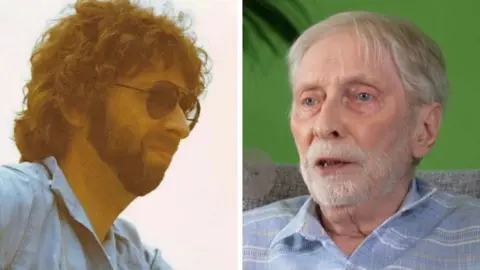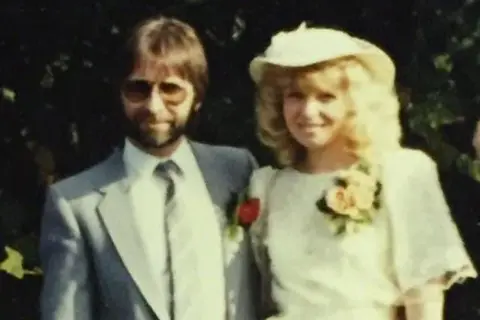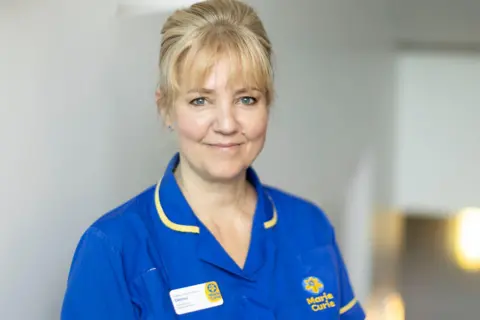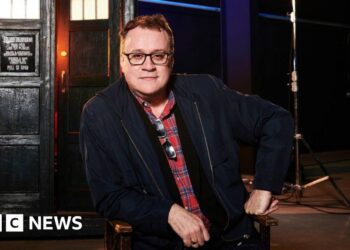 Getty Images
Getty ImagesFor years, local DJ Dave Gilmore soundtracked other people’s nights out in pubs and clubs.
But now he’s curating a uniquely personal playlist – the songs of his own life to carry him through terminal illness.
The list includes both November Rain and Sweet Child O’ Mine by Guns and Roses, Apache by The Shadows – which inspired Dave to play guitar – and Pink Floyd’s Comfortably Numb.
Hazel O’Connor’s 1980 hit Will You? is dedicated to his wife and mother to their two children.
An ode to tentative yet powerful romantic tension, it is known for its saxophone solo – an instrument Dave also learned to play.
“It’s our tune from when we got together,” Dave tells BBC’s Morning Live, tapping his feet.
As the song evokes memories, his wife Kate quietly adds “the fight was worth it.”
 Kate Gilmore/BBC Morning Live
Kate Gilmore/BBC Morning LiveMoments like this emphasise the power of music to forge everlasting connection.
Its therapeutic benefits are increasingly recognised in palliative and end of life care.
The impact is neurological as well as emotional, explains Sarah Metcalfe, managing director of the Utley Foundation’s Music for Dementia campaign.
Brain activity scans show music “lights up” multiple parts of our brain, simultaneously touching physical and emotional sense centres.
“Even if one part of the brain is damaged, those other parts can still be accessed,” Sarah says.
 Kate Gilmore
Kate GilmoreUK charity Marie Curie surveyed 1,000 adults whose loved ones had received care in the final stages of life.
It found listening to music together helped to create a shared experience that brought them closer, creating a sense of normality and helping them relax.
Kate experienced this first hand. When Dave once returned home after a lengthy hospital stay, he was twitchy and exhausted but unable to sleep.
Out of desperation she turned to Native American music, one of his favourite genres to relax to.
“And then all of a sudden, this agitated, anxious man began to sleep,” she recalls.
Diana Schad, a staff nurse at the Marie Curie hospice in Glasgow with 19 years of experience as well as a musician herself, has installed a piano for patients and volunteers to use.
She says it is important to consider the feelings music evokes.
“You’ve always got to ask yourself, is this what they would like to be feeling at the moment?” says Diana.
How to make a good palliative playlist
1. Focus on music memories between ages 10-30, which is when the strongest associations are formed
2. Include songs connected to special, significant places and important life events – youth, holidays, romance, first dances and wedding songs
3. Consider feelings sparked by songs – these can be just as powerful as memory association
4. Remember that music can trigger memories even for people with conditions like dementia by connecting multiple brain regions. Use resources like BBC Music Memories to spark memory recall
5. Be open to unexpected musical connections, like TV show themes or commercial jingles that might hold special meaning
Source: Music for Dementia’s managing director, Sarah Metcalfe
 Marie Curie
Marie CurieExperts agree that music can reduce anxiety and psychological pain, even when someone is unconscious.
Dr Sam Murphy, senior lecturer at the Open University, specialises in thanatology, the study of death and the practices associated with it.
“There’s certainly evidence to suggest that hearing is the last sense to go so even when someone is unconscious or unresponsive, music can still reach them,” she says.
“It keeps them connected to their surroundings, to the people they love, and to the sense of being alive and those memories that they’ve had.”
An everlasting comfort in death
Music can be equally helpful to loved ones after a person has passed away.
“I think it’s just another distraction for those people that are mourning a loved one,” Dr Murphy says. “But there’s that comfort in knowing that they’re listening to something that their loved one would have listened to over the years.”
This is true for Anna-Kay Brocklesby, whose husband Ian passed away from prostate cancer in 2023.
As Ian’s health deteriorated, sharing his favourite songs became a crucial part of their family’s coping mechanism.
It became a way to keep spirits up and stay positive, says his wife.
“Every morning he would go down and make the tea, he would play. Oh, What a Beautiful Morning from the musical Oklahoma,” she says.
“And he would belt it out. He used it as a sort of mindset of, this is how today’s going to be”.
They would play Frank Sinatra, Nat King Cole, and Elton John songs, which provided comfort and connection.
Two years after Ian died, Anna-Kay still finds comfort in the music they shared together.
“He lives on in us in many, many ways,” says Anna-Kay, “but music can take us to a place with Ian”.
Source link : https://www.bbc.com/news/articles/c3e7n40vyx2o?at_medium=RSS&at_campaign=rss
Author :
Publish date : 2025-09-22 00:28:00
Copyright for syndicated content belongs to the linked Source.















